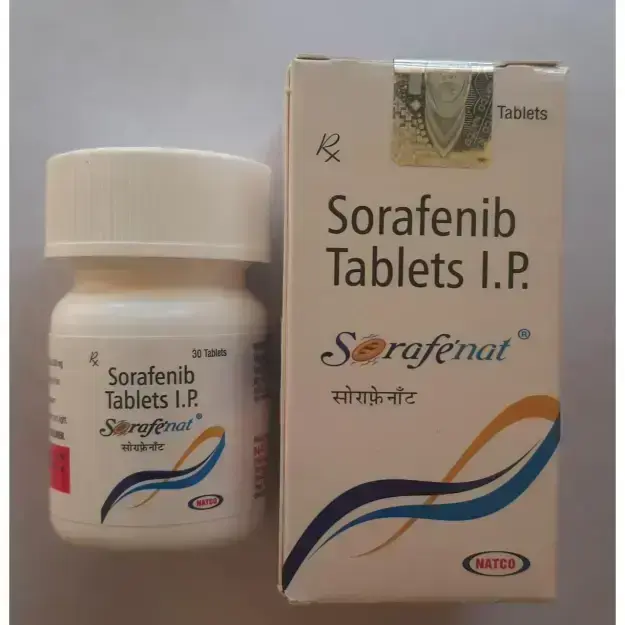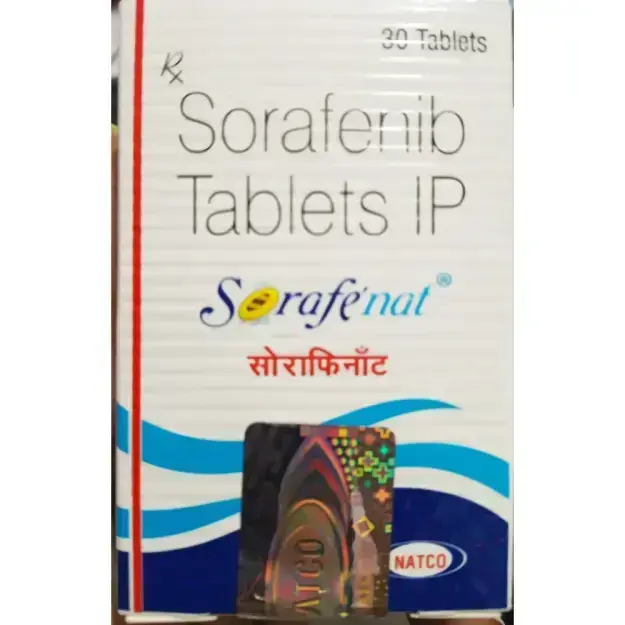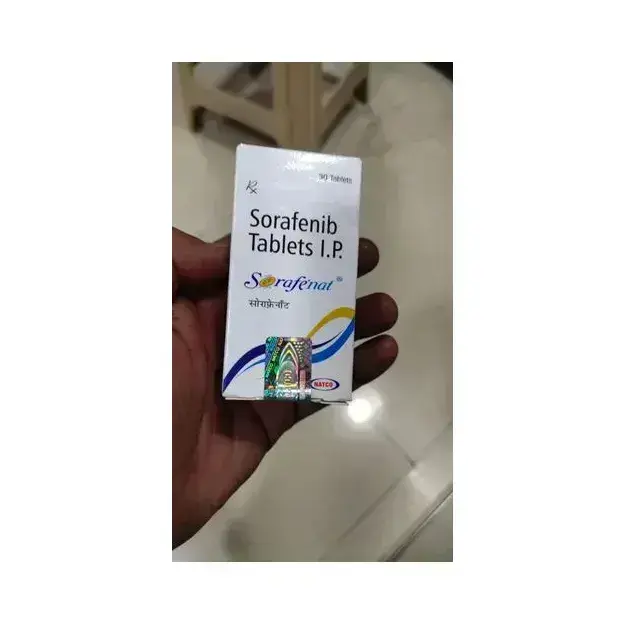Sorafenat consists of Sorafenib, is an oral multi-kinase inhibitor used in the treatment of various types of cancer. It works by inhibiting multiple kinases that are involved in tumor cell proliferation and angiogenesis (the formation of new blood vessels). Sorafenib is primarily used in the management of liver cancer, renal cell carcinoma (RCC), and thyroid cancer. Sorafenib is an effective treatment for several types of advanced cancers, including liver, kidney, and thyroid cancer. Its multi-kinase inhibition strategy provides an advantage in controlling tumor growth and blood vessel formation. However, patients must be carefully monitored for side effects such as liver toxicity, skin reactions, and cardiovascular issues. Regular follow-up and dose adjustments may be required to optimize the therapeutic benefits of sorafenib while minimizing risks.
Mechanism of Action
Sorafenib inhibits several kinases involved in cancer cell growth and blood vessel formation, including:
- Raf kinase: This is part of the MAPK signaling pathway, which is involved in cell division and survival.
- VEGFR (Vascular Endothelial Growth Factor Receptor): By blocking VEGFR, sorafenib inhibits the formation of blood vessels that supply tumors, a process known as angiogenesis.
- PDGFR (Platelet-Derived Growth Factor Receptor): It also blocks PDGFR, which plays a role in tumor cell proliferation and migration.
- c-Kit and RET receptors: These are involved in various signaling pathways related to cancer cell growth and survival.
By inhibiting these pathways, sorafenib helps slow down the progression of cancer.
Medical Uses
-
Hepatocellular Carcinoma (HCC): Sorafenib is approved for the treatment of advanced liver cancer, specifically hepatocellular carcinoma. It is used when the cancer is not amenable to surgery or other localized treatments.
-
Renal Cell Carcinoma (RCC): It is used in advanced renal cell carcinoma, particularly for patients who have not responded to prior therapies or are inoperable.
-
Differentiated Thyroid Cancer (DTC): Sorafenib is used for the treatment of advanced thyroid cancer, particularly in cases where the disease is refractory to radioactive iodine therapy.
-
Other Investigational Uses: Sorafenib is also being studied in the treatment of other cancers such as gastric cancer, pancreatic cancer, and melanoma.
Dosage and Administration
- Sorafenib is taken orally, typically in the form of tablets.
- The usual dose is 400 mg twice daily (total of 800 mg per day), but the dose may vary depending on the condition being treated and the patient's overall health.
- The tablets should be taken on an empty stomach, at least one hour before or two hours after meals, to ensure proper absorption.
Side Effects
Common side effects of sorafenib include:
- Skin reactions: Rash, hand-foot syndrome (redness, swelling, and pain on the palms of the hands and soles of the feet), and dry skin.
- Gastrointestinal issues: Diarrhea, nausea, vomiting, and abdominal pain.
- Hypertension: Increased blood pressure is a known side effect.
- Fatigue: Many patients experience tiredness or weakness.
- Liver toxicity: Liver enzyme levels may rise, indicating potential liver damage.
- Bleeding: Sorafenib may increase the risk of bleeding, especially in the gastrointestinal tract.
Serious but less common side effects include heart problems, lung toxicity, and severe skin reactions.
Drug Interactions
Sorafenib is metabolized by the CYP3A4 enzyme, and therefore, drugs that induce or inhibit this enzyme can affect sorafenib's blood levels. For instance:
- CYP3A4 inhibitors (e.g., ketoconazole, ritonavir) may increase sorafenib levels and enhance its side effects.
- CYP3A4 inducers (e.g., rifampin, carbamazepine) may reduce sorafenib's effectiveness by lowering its blood concentration.
Patients should also avoid grapefruit and grapefruit juice as they can inhibit CYP3A4 and increase sorafenib levels.
Precautions
-
Liver Function: Sorafenib is metabolized in the liver, so patients with preexisting liver problems or those who experience liver toxicity during treatment need careful monitoring.
-
Cardiovascular Monitoring: Sorafenib may cause high blood pressure and heart issues, so regular cardiovascular monitoring is recommended.
-
Bleeding Risk: The drug may increase the risk of bleeding, especially in patients with a history of bleeding disorders or those undergoing surgery.
-
Pregnancy Category: Sorafenib is classified as pregnancy category D, meaning it can harm a fetus. It should be avoided during pregnancy and used with caution in women who could become pregnant.
Contraindications
-
Hypersensitivity: Patients with known hypersensitivity to sorafenib or any of its components should not use the drug.
-
Pregnancy and Breastfeeding: Sorafenib is not recommended during pregnancy and breastfeeding due to its potential harmful effects on the fetus or newborn.
X







